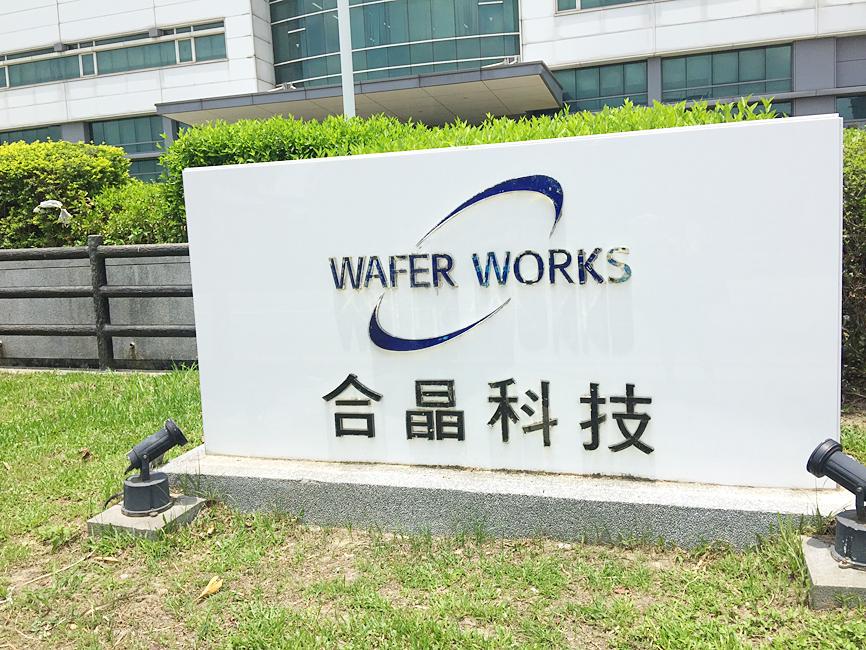Wafer Works Corp (合晶科技), the world’s No. 6 silicon wafer supplier, is to invest NT$2.4 billion (US$81.41 million) to expand its 12-inch wafer capacity at an existing plant in the Longtan (龍潭) section of Hsinchu Science Park (新竹科學園區) to meet rising demand for chips used in vehicles, the Ministry of Economic Affairs said yesterday.
Wafer Works in May 2019 received ministry approval for a NT$1.16 billion capacity expansion plan at its Longtan site, allowing the wafer maker to join the government’s Invest in Taiwan initiative, the ministry said in a statement.
The automotive sector accounted for 50 percent of Wafer Works’ total revenue of NT$10 billion last year, up from 37 percent in 2020, the company said.

Photo: Hung Yu-fang, Taipei Times
Wafer Works plans to build a new smart wafer production line and add new cleanrooms to boost capacity, aiming to address surges in demand for 12-inch wafers, the statement said.
The project is expected to create 48 new jobs, it said.
As part of the new project, the company is to install solar power generation systems, and water and waste recycling facilities to reduce carbon emissions, the ministry said.
The company also operates 12-inch factories in Zhengzhou in China’s Henan Province and in Shanghai, supplying wafers to Chinese customers, the company said.
COVID-19 lockdowns in China have made it difficult for its Shanghai site to ship products, though production remains normal, it said.
Wafer Works’ revenue last month jumped 26.53 percent from a year earlier to NT$1.04 billion, primarily due to increased prices, the company said.
The company generated revenue of NT$3.05 billion last quarter, up 33 percent from NT$2.29 billion in the first quarter last year, a company filing with the Taiwan Stock Exchange showed.
The ministry said its latest data showed that the Invest in Taiwan initiative has drawn investment commitments from 1,190 companies totaling NT$1.68 trillion, with 133,554 local jobs expected to be created.

CHIP RACE: Three years of overbroad export controls drove foreign competitors to pursue their own AI chips, and ‘cost US taxpayers billions of dollars,’ Nvidia said China has figured out the US strategy for allowing it to buy Nvidia Corp’s H200s and is rejecting the artificial intelligence (AI) chip in favor of domestically developed semiconductors, White House AI adviser David Sacks said, citing news reports. US President Donald Trump on Monday said that he would allow shipments of Nvidia’s H200 chips to China, part of an administration effort backed by Sacks to challenge Chinese tech champions such as Huawei Technologies Co (華為) by bringing US competition to their home market. On Friday, Sacks signaled that he was uncertain about whether that approach would work. “They’re rejecting our chips,” Sacks

NATIONAL SECURITY: Intel’s testing of ACM tools despite US government control ‘highlights egregious gaps in US technology protection policies,’ a former official said Chipmaker Intel Corp has tested chipmaking tools this year from a toolmaker with deep roots in China and two overseas units that were targeted by US sanctions, according to two sources with direct knowledge of the matter. Intel, which fended off calls for its CEO’s resignation from US President Donald Trump in August over his alleged ties to China, got the tools from ACM Research Inc, a Fremont, California-based producer of chipmaking equipment. Two of ACM’s units, based in Shanghai and South Korea, were among a number of firms barred last year from receiving US technology over claims they have

BARRIERS: Gudeng’s chairman said it was unlikely that the US could replicate Taiwan’s science parks in Arizona, given its strict immigration policies and cultural differences Gudeng Precision Industrial Co (家登), which supplies wafer pods to the world’s major semiconductor firms, yesterday said it is in no rush to set up production in the US due to high costs. The company supplies its customers through a warehouse in Arizona jointly operated by TSS Holdings Ltd (德鑫控股), a joint holding of Gudeng and 17 Taiwanese firms in the semiconductor supply chain, including specialty plastic compounds producer Nytex Composites Co (耐特) and automated material handling system supplier Symtek Automation Asia Co (迅得). While the company has long been exploring the feasibility of setting up production in the US to address

OPTION: Uber said it could provide higher pay for batch trips, if incentives for batching is not removed entirely, as the latter would force it to pass on the costs to consumers Uber Technologies Inc yesterday warned that proposed restrictions on batching orders and minimum wages could prompt a NT$20 delivery fee increase in Taiwan, as lower efficiency would drive up costs. Uber CEO Dara Khosrowshahi made the remarks yesterday during his visit to Taiwan. He is on a multileg trip to the region, which includes stops in South Korea and Japan. His visit coincided the release last month of the Ministry of Labor’s draft bill on the delivery sector, which aims to safeguard delivery workers’ rights and improve their welfare. The ministry set the minimum pay for local food delivery drivers at